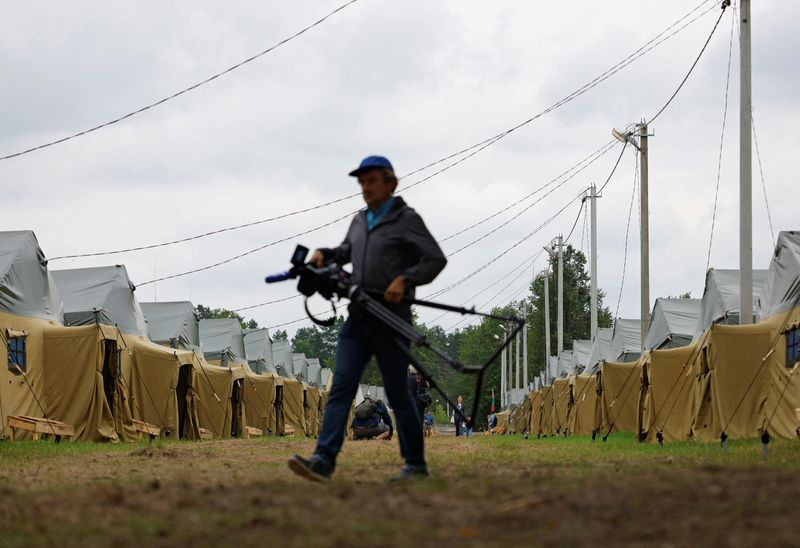New hazards of war enclose Belarusian town with turbulent past
2023.07.07 13:11

© Reuters. A journalist walks in a tent camp, which, according to the Belarusian Defence Ministry, was set up for exercises at a disused military base near the village of Tsel in the Asipovichy District, Belarus July 7, 2023. REUTERS/Maxim Shemetov
By Guy Faulconbridge
OSIPOVICHI, Belarus (Reuters) – A Belarusian town with a turbulent past may hold some haunting new secrets: an empty camp that mutinous Russian mercenaries have yet to use and perhaps even a storage facility for tactical nuclear weapons Russia says it has deployed in Belarus.
In a former military camp surrounded by fir and birch forest just north of Osipovichi, more than 300 large tents have been put up by the Belarusian army but Wagner mercenaries have yet to say if they want to use it.
Belarus invited foreign journalists to visit the empty camp beside the village of Tsel as part of an attempt to deflate reports that the camp had been prepared specially for Wagner as part of a deal to end its June 24 mutiny in Russia.
The camp, empty besides mosquitoes, raises questions about the fate of the deal President Vladimir Putin struck to defuse the biggest challenge to the Russian state since the failed 1991 hardline coup attempt against Mikhail Gorbachev.
President Alexander Lukashenko has offered Wagner chief Yevgeny Prigozhin the use of camps including the one at Tsel, though he said on Thursday that Prigozhin and his fighters were still in Russia. It is unclear why.
No one from Wagner has yet visited the camp, said General-Major Leonid Kasinsky, an aide to the Belarusian defence ministry for ideological work.
“You journalists should not try to make a sensation out of nothing,” Kasinsky told foreign reporters at the camp, about 90 km (56 miles) south of the capital Minsk and around 230 km (140 miles) north of the Ukrainian border.
“This is a summer camp created as part of a training exercise,” said Kasinsky. “No one from Wagner has yet come here to inspect the camp.”
Osipovichi has long swayed to the tides of European history. It was once part of the Grand Duchy of Lithuania and then the Russian empire, it hosted Bolshevik revolutionaries and was occupied by Nazi Germany before the Red Army took it back in World War Two.
NUCLEAR WEAPONS?
Amid today’s Ukraine war, the biggest land war in Europe since 1945, the town is again being enclosed by the tentacles of distant tumult.
Just east of the town, nestled behind forest, lies a secret installation that the U.S. Central Intelligence Agency believes was visited by a senior Russian officer as a potential upgrade to nuclear weapons storage, according to the Federation of American Scientists.
Its top nuclear researcher, Hans Kristensen, said in a research note that it had yet to find visual evidenceconclusively indicating the presence of an active nuclear weapons facility on the territory of Belarus.
Lukashenko told reporters on Thursday that the nuclear weapons from Russia were purely defensive, but cautioned that any aggression against Belarus would result in a split-second response.
“If you make any aggression against Belarus, the answer will be instant. The targets have been defined,” he said.
Asked about the research which indicated the installation might be used for nuclear weapons, Kasinsky said: “Perhaps the CIA thinks that; I don’t know what that’s based on.
“No one is ever going to tell you where the tactical nuclear weapons are stationed – you should understand that,” Kasinsky said. He repeatedly refused to confirm or deny whether the nuclear weapons were outside Osipovichi.
To the west of Osipovichi is a training base where nuclear-capable Iskander short-range missile launchers that Russia transferred to Belarus in 2022 have been spotted. Iskanders are one of the delivery vehicles for the nuclear warheads which Minsk and Moscow now say are in Belarus.
To the south of town is a Belarusian military base.
In the town, a large statue of Vladimir Lenin strides forward into the Communist future that is no more, graced now on the main square by several pharmacies, a cafe called “Youth”, a supermarket, a bank and a smattering of foreign cars.
“Why the hell do we need Wagner here?” I don’t see anything good from having them here,” said Ilya Petrov, a 50-year-old resident. “We don’t need such comrades just as we don’t need any war either. We are a peaceful people, a peaceful country – but it seems some want to make us totally unpeaceful.”
Another resident who asked that his name not to be used due to the sensitivity of speaking about politics in Belarus voiced concerns about the convicts who were recruited to Wagner with promises of pardons after fighting in Ukraine.
Lukashenko said on Thursday that Russia had already deployed tactical nuclear weapons on his territory, and derided the West’s spies for missing the transport of the warheads, which he said had not gone by land.
“You should not try to make some sort of horror story out of the tactical nuclear weapons,” said Kasinsky.
“We don’t want to fight with anyone but… if anyone in the West is hoping that in the case of aggression against us then only the mothers and wives of Belarusians will weep, then they are deeply mistaken.”








